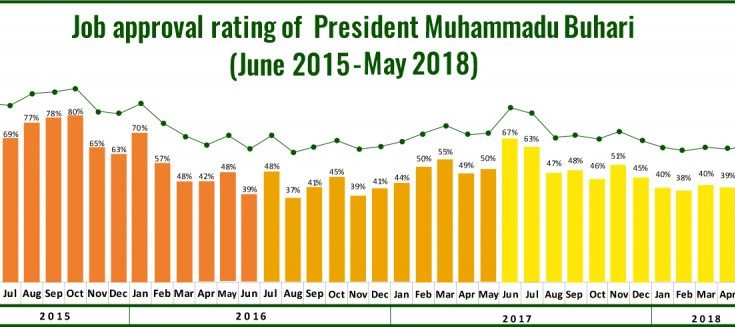Today NOIPolls, Nigeria’s premier public opinion polling firm, releases its compilation of public opinion polls on a monthly series of presidential approval rating to appraise the job performance of President Muhammadu Buhari. Since January 2013, NOIPolls has been conducting monthly approval ratings on the job performance of Nigeria’s sitting president; and this has continued through the assumption of office of President Muhammadu Buhari.
In commemoration of President Buhari’s 3rd year in office, we release figures from our monthly approval rating for the 3-year period (June 2015 to May 2018). The results show that over the last three years the President’s job performance rating has taken a downward plunge, plummeting from his highest rating of 78 percent and 80 percent recorded in September and October 2015, to 37 percent recorded in August 2016 and more recently 38 percent and 39 percent in the months of February and April 2018 respectively. In more specific terms, the average approval rating of the president in 2018 stands below average at 39.6 percent; with his latest rating of May 2018 at 41 percent.
Ratings
Furthermore, Nigerians also appraised the performance of President Buhari on specific indicators using a Likert scale of 1 to 5, where 1 represents Very Poor and 5 represents Excellent. Starting off with his 3 cardinal policy thrusts: the president was rated 43 percent on Security; 32 percent on Corruption; and 16 percent on the Economy. Similarly, he scored 34 percent on Agriculture and Food Security, 27 percent on Power, 25 percent on Healthcare, 24 percent on Education, 21 percent on Infrastructure, 15 percent on Job Creation, and 12 percent on Poverty Alleviation. Overall, from the 10 key indicators analyzed, President Buhari was rated poorly on 9 indicators, with only 1 indicator rated below average (security).
Finally, from our constant interactions with the public and our numerous field visits across the country, these findings do not come as a surprise to us; especially with the heightened state of insecurity, ballooning unemployment and harsh economy on millions of Nigerians. Consequently, with figures from the National Bureau of Statistics (NBS) showing that the unemployment rate rose from 16.2 to 18.8 percent between Q2 and Q3 2017, it isn’t surprising that the President’s lowest indicator ratings were on poverty alleviation (12 percent), job creation (15 percent) and the economy (16 percent). In 2017 alone over 1.2 million Nigerians joined the labour market, as NBS revealed that Nigeria’s labour population increased from 83.9 million to 85.1 million between Q2 and Q3 alone[1], without adequate job creation policies and social safety nets to tackle unemployment and poverty. These are the key findings from the monthly Presidential Approval Polls conducted between June 2015 and May 2018.
Methodology & Socio-Demographics
NOIPolls – Nigeria’s premier public opinion polling firm, has been conducting a monthly series of approval ratings to gauge the opinions of Nigerians and measure the job performance of the president since January 2013. The poll series for President Muhammadu Buhari’s administration commenced in June 2015; and is typically conducted on the last few days of every month to appraise the president’s job performance for the month. So far, 36 polls have been conducted in this series (June 2015 through May 2018). During this period, pollsters from NOIPolls have spoken to over 180,000 Nigerians, with 36,000 completed interviews across the country.
The polls involved telephone interviews of a proportionate nationwide sample of 36,000 randomly selected phone-owning Nigerians aged 18 years and above (1,000 completed interviews per month), representing the six geopolitical regions and 36 states & the FCT of the country. Interviews were conducted in 5 languages – Igbo, Hausa, Yoruba, Pidgin English and English. Although we can say with 95% confidence that the results obtained were statistically precise (on a monthly basis) – within a margin of error of plus or minus 3%; we recognize that the exclusive use of telephone polling has its limitation of excluding non-phone-owning Nigerians. Nonetheless, with the country’s teledensity put over 100 percent by the Nigerian Communications Commission (NCC), we consider our telephone polling approach appropriate. Also, given the rigorous scientific process of randomization & stratification applied, we can confidently stand by the validity of our methodology and approach.












